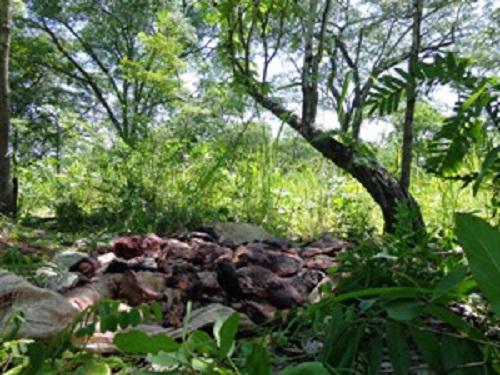Paulo Wilfred
Other projects
18 Dec 2018
Capacity Building for Better Conservation Rules Enforcement in Western Tanzania
3 Aug 2020
Capacity Building for Better Conservation Rules Enforcement in Western Tanzania: A Community’s Perspective
This project aims to explore the challenges and opportunities for effectively incorporating livelihoods into the wildlife conservation efforts in western Tanzania.

Buffalo meat abandoned by poachers during 2016 wet season patrols.
Illegal exploitation of natural resources, especially wildlife, in Tanzania is currently devastating populations of different species and their habitats thereby affecting the economy of the country. Western Tanzania is among the problematic areas in the country. Logging, the killing of elephants and other species of conservation importance as well as bushmeat hunting are widespread in the area. Unsustainable farming and illegal settlement practices are also increasingly degrading and destroying wildlife habitats. Consequently, the proposed study is timely and the Rufford Small Grant Scheme will significantly contribute to reversing the situation. The study originates from a previous study that was also funded by the Rufford Foundation. It will explore the governance capacity to manage wildlife areas in western Tanzania, and assess natural resource-based livelihoods and resource exploitation drivers that link to a range of governance issues across the wildlife, forestry, beekeeping, and fisheries sectors.
Relevant information will be collected from all local conservation institutions in western Tanzania. Interviews will be conducted with members of the conservation institutions. The interviews will rigorously explore their activities, effectiveness and sustainability with respect to local livelihoods, wildlife conservation and conservation enforcement. On the other hand, a variety of different relevant approaches (for example, questionnaire surveys, participatory rural appraisal and randomised response technique) will be used to glean information about local livelihoods and illegal resource use from local communities in western Tanzania.
The wider vision of the present project is to reduce illegal exploitation of natural resources through simultaneously improving both local livelihoods and conservation enforcement. Indeed, this is in line with Millennium Development Goal 7–‘Ensuring Environmental Sustainability’–that insists on sustainable development that goes hand in glove with reversing the loss of biodiversity. The project will put forth handy recommendations for successful adoption of proven modern approaches to conservation by the conservation authorities in the study area, and ensuring that local livelihoods are improved through sustainable environmentally friendly socio-economic activities.